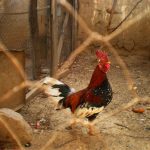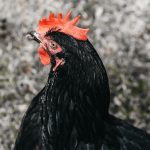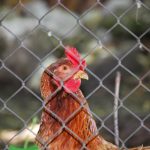Chickens and mice are commonly kept as pets or for agricultural purposes, offering different benefits and challenges to their caretakers. Chickens are primarily raised for egg production and meat, while mice are often kept as pets or used in scientific research. Both animals require specific care, including appropriate housing, nutrition, and health management.
Chickens are social birds that perform best in flocks, whereas mice are known for their inquisitive and active nature. Proper housing is essential for both species, with chickens needing secure coops and outdoor runs, and mice requiring escape-proof enclosures with ample space for exploration and exercise. Nutrition is a critical aspect of care for both chickens and mice.
Chickens require a balanced diet of grains, proteins, and supplements to support egg production and overall health. Mice have specific dietary needs that vary depending on their age and purpose (pet or laboratory animal). Health management is crucial for both species.
Regular veterinary check-ups, parasite prevention, and prompt treatment of illnesses are necessary to maintain the well-being of chickens and mice. Additionally, understanding and managing their behavior and social dynamics is important for their mental health and productivity. For chicken keepers, maximizing egg production and implementing effective breeding practices may be of interest.
Those keeping mice should be aware of proper pest control measures and predation prevention strategies to ensure the safety of their animals. By understanding and meeting the specific needs of chickens and mice, caretakers can provide a safe and enriching environment for these animals to thrive, whether as pets, livestock, or research subjects.
Table of Contents
- 1 Housing and Enclosures for Chickens and Mice
- 2 Feeding and Nutrition for Chickens and Mice
- 3 Health and Veterinary Care for Chickens and Mice
- 4 Managing Behavior and Social Dynamics in Chickens and Mice
- 5 Egg Production and Breeding in Chickens
- 6 Pest Control and Predation Prevention for Chickens and Mice
- 7 FAQs
- 7.1 What are some benefits of keeping chickens and mice?
- 7.2 What are some important considerations when keeping chickens and mice together?
- 7.3 What are some common health concerns when keeping chickens and mice?
- 7.4 What are some tips for keeping chickens and mice healthy and happy?
- 7.5 Are there any legal considerations for keeping chickens and mice?
Key Takeaways
- Keeping chickens and mice can be a rewarding and enjoyable experience for both pets and for egg production.
- Proper housing and enclosures are essential for the health and safety of chickens and mice, including providing adequate space and protection from predators.
- Feeding and nutrition for chickens and mice should be carefully monitored to ensure they receive a balanced diet for optimal health and egg production.
- Regular health check-ups and veterinary care are important for preventing and treating illnesses in chickens and mice.
- Understanding and managing the behavior and social dynamics of chickens and mice is crucial for maintaining a harmonious and stress-free environment.
Housing and Enclosures for Chickens and Mice
Chickens’ Housing Needs
A secure coop or henhouse is essential for chickens to protect them from predators and provide a safe place for them to roost and lay eggs. The coop should be spacious enough to allow for natural behaviors such as scratching and dust bathing, and it should be well-ventilated to prevent respiratory issues. Additionally, the coop should have nesting boxes for egg-laying and perches for roosting at night. Outdoor access to a fenced-in run is also important to allow chickens to forage and exercise.
Mice’s Housing Needs
Mice require a secure cage with plenty of space for exercise and exploration. The cage should have multiple levels, tunnels, and hiding spots to encourage natural behaviors and prevent boredom. Bedding material such as shredded paper or aspen shavings should be provided for nesting and burrowing, and a wheel or other toys can help keep mice mentally stimulated. It’s important to regularly clean the cage to prevent the buildup of waste and bacteria.
Common Housing Considerations
Both chickens and mice require protection from extreme temperatures, drafts, and predators, so it’s important to carefully consider the design and placement of their housing and enclosures.
Feeding and Nutrition for Chickens and Mice

Proper feeding and nutrition are essential for the health and well-being of chickens and mice. Chickens require a balanced diet that includes a high-quality commercial feed, as well as access to fresh water and supplemental treats such as fruits, vegetables, and mealworms. It’s important to provide chickens with access to grit to aid in digestion, as well as oyster shell or another source of calcium to support egg production.
Additionally, free-ranging chickens will supplement their diet with insects, grass, and other natural foods. Mice also require a balanced diet that includes a high-quality commercial mouse food, as well as fresh water and occasional treats such as fruits, vegetables, and small amounts of lean protein. It’s important to avoid overfeeding mice, as obesity can lead to health issues such as diabetes and heart disease.
Additionally, mice should have access to chew toys or blocks to help keep their teeth healthy and prevent overgrowth. Both chickens and mice have specific dietary needs that must be met in order for them to thrive, so it’s important to carefully research and provide the appropriate food and nutrition for each species.
Health and Veterinary Care for Chickens and Mice
Maintaining the health of chickens and mice is essential for their overall well-being. Regular health checks are important for both species, as early detection of illness or injury can lead to better outcomes. Chickens should be monitored for signs of respiratory issues, parasites, and reproductive problems, while mice should be checked for signs of dental issues, tumors, and respiratory problems.
It’s important to establish a relationship with a veterinarian who is knowledgeable about the specific needs of chickens and mice in order to provide proper care when needed. Preventative care is also important for both chickens and mice. This includes regular vaccinations for chickens to prevent diseases such as Marek’s disease and Newcastle disease, as well as parasite prevention through regular cleaning of the coop and administering appropriate medications.
For mice, preventative care includes regular cage cleaning, providing a clean environment with proper ventilation, and monitoring for signs of illness or injury. By staying proactive about the health of chickens and mice, you can help ensure that they live long and healthy lives.
Understanding the behavior and social dynamics of chickens and mice is essential for providing them with a safe and enriching environment. Chickens are social animals that establish a pecking order within their flock. It’s important to provide enough space, food, water, and resources to prevent aggression among chickens.
Additionally, providing environmental enrichment such as perches, dust bathing areas, and toys can help reduce stress and boredom in the flock. Mice are also social animals that thrive in groups, but it’s important to carefully manage their social dynamics to prevent aggression or bullying. Providing multiple hiding spots, tunnels, and toys can help reduce stress among mice living together.
It’s important to monitor their behavior closely to ensure that they are getting along well. Understanding the natural behaviors of chickens and mice can help you create an environment that meets their social needs while preventing conflicts.
Egg Production and Breeding in Chickens

Optimizing Egg Laying
Providing proper nutrition, housing, and care is essential for maximizing egg production in chickens. Most laying breeds will start laying eggs around 5-6 months of age, with peak production occurring at around 1-2 years old.
Nutrition and Environment
It’s important to provide a balanced diet with adequate calcium to support eggshell formation, as well as a consistent light cycle to encourage regular laying.
Breeding Chickens
Breeding chickens requires careful consideration of genetics, health, and housing. If you’re interested in breeding chickens, it’s important to select healthy breeding stock with desirable traits such as good egg production or meat quality. Additionally, providing a separate breeding pen or area can help prevent accidental mating or aggression among breeding pairs. Understanding the natural breeding behaviors of chickens can help you create a successful breeding program that produces healthy offspring.
Pest Control and Predation Prevention for Chickens and Mice
Protecting chickens and mice from pests and predators is essential for their safety and well-being. Common predators of chickens include foxes, raccoons, hawks, and snakes, while mice are often targeted by cats, snakes, and birds of prey. It’s important to secure their housing with sturdy fencing or wire mesh to prevent entry by predators.
Additionally, providing secure locks on coop doors or cage latches can help prevent break-ins by predators. Pest control is also important for both chickens and mice. Common pests that can affect chickens include mites, lice, fleas, and rodents, while mice may be affected by mites, lice, fleas, or ticks.
Regular cleaning of the coop or cage can help prevent pest infestations, as well as providing dust baths for chickens or nesting material for mice that repels pests. Additionally, using natural pest control methods such as diatomaceous earth or predator insects can help keep pests at bay without harming chickens or mice. In conclusion, keeping chickens and mice requires careful consideration of their specific needs in terms of housing, feeding, health care, behavior management, egg production, breeding, pest control, and predation prevention.
By understanding the unique requirements of each species, you can create a safe and enriching environment for them to live and thrive. Whether you’re raising chickens for eggs or meat or keeping mice as pets or for research purposes, providing proper care is essential for their overall well-being. With the right knowledge and resources, you can enjoy the many benefits of keeping chickens and mice while ensuring that they lead happy and healthy lives.
If you’re interested in keeping chickens and mice, you may also want to read about the importance of the floor of a chicken coop. Check out this article for tips on how to maintain a clean and safe environment for your poultry.
FAQs
What are some benefits of keeping chickens and mice?
Keeping chickens can provide fresh eggs, natural pest control, and fertilizer for your garden. Mice can help control insect populations and provide companionship as pets.
What are some important considerations when keeping chickens and mice together?
It’s important to provide separate living spaces for chickens and mice to prevent any potential conflicts or health issues. Additionally, proper hygiene and cleanliness are crucial to prevent the spread of diseases.
What are some common health concerns when keeping chickens and mice?
Common health concerns for chickens include respiratory infections, parasites, and egg-related issues. For mice, common health concerns include respiratory infections, dental problems, and tumors.
What are some tips for keeping chickens and mice healthy and happy?
Provide a balanced diet, clean living environments, regular veterinary check-ups, and opportunities for exercise and mental stimulation. Additionally, ensure that chickens and mice have appropriate social interactions with their own species.
Are there any legal considerations for keeping chickens and mice?
It’s important to check local regulations and zoning laws to ensure that keeping chickens and mice is allowed in your area. Some areas may have restrictions on the number of animals you can keep or specific requirements for their housing and care.
Meet Walter, the feathered-friend fanatic of Florida! Nestled in the sunshine state, Walter struts through life with his feathered companions, clucking his way to happiness. With a coop that’s fancier than a five-star hotel, he’s the Don Juan of the chicken world. When he’s not teaching his hens to do the cha-cha, you’ll find him in a heated debate with his prized rooster, Sir Clucks-a-Lot. Walter’s poultry passion is no yolk; he’s the sunny-side-up guy you never knew you needed in your flock of friends!







